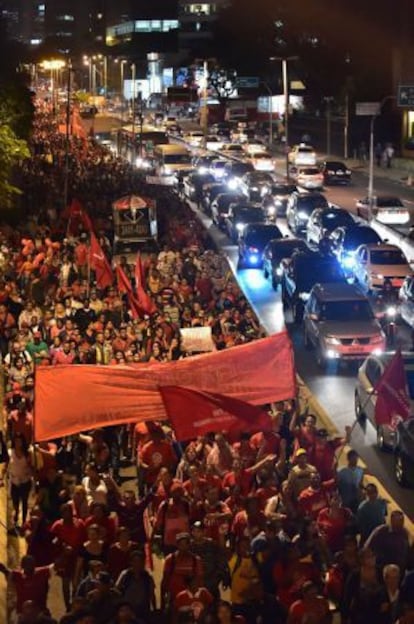Brazilian homeless protestors threaten to shut down World Cup
Marchers have caused traffic chaos in São Paulo for three consecutive days 30 percent of city’s residents live in inadequate housing

“If they don’t meet our demands, we are going to shut down the World Cup. If they don’t respect our rights, there will be no opening ceremony on June 12.” The threat has been an oft-repeated one in Brazil of late, and this time it came from the Homeless Workers Movement (MTST), whose marches have caused traffic chaos in São Paulo for three consecutive days. MTST and the Urban Resistance Front organized what was billed as “the city’s largest demonstration of the year.” Military police confirmed that 5,000 people attended the rally on Thursday while organizers say the crowd reached 20,000.
“We have a clear proposition,” MTST leader Guillherme Boulos said before he attacked the construction companies that he said would benefit the most from the events. “They don’t profit from the World Cup unless they also show respect for our rights. The ball is in the people’s court. We want our slice of the cake and not just the crumbs.”
The threat is also a clear one. “They told us in Brasilia that all resources for government housing had been tapped out but the ones for Fifa have not been. Either they show up with the money or World Cup June will become Red June [in reference to the color used by populist activist movements].”
Students and various other groups joined in the demonstration. The Urban Resistance Front, an umbrella for various social movements, oversees a group of activist homeless workers. Its causes – for which it has already held three marches this month – include housing, health, public transportation, education, and life pensions for the families of the workers who have died or suffered serious injury as a result of working on World Cup construction sites. Nine workers have died building stadiums that will host the games in June. The budget to build the new facilities surpasses the cost of preparations for the last two World Cups in South Africa and Germany.
The march started with a rallying cry: “If the World Cup leaves the people out, everyone out on the street.” Protestors blocked off important roadways for hours. At 7pm, 248 kilometers of the city’s streets were cut off, nearly breaking the record for slow traffic days this year. That record still belongs to the bus drivers and passengers who parked their vehicles in the middle of the streets on Wednesday to demand better work conditions.
They don’t profit from the World Cup unless they also show respect for our rights”
According to the municipal housing office, there are about 290,000 vacant homes in São Paulo today. Yet, almost 3.2 million people, 30 percent of the city, live in inadequate housing, the office said in a report. Either residents do not own the poorly constructed homes where they live and pay excessive rents – as is the case in the favelas – or they live in dangerous areas.
Less than a kilometer away from the stadium where the inaugural World Cup game will take place, a community of 300 families awaits government-subsidized housing. They live near an open sewer and have limited access to electricity. MTST has set up tents in the area where 5,000 families are now protesting to demand housing from the federal program, Minha Casa Minha Vida, under the banner of the “People’s Cup.”
As the World Cup nears, workers from various unions – teachers, police officers, drivers of public transport – have called for a strike to make a show of power before the tournament begins. Earlier this month, hundreds of homeless people held a sit-in at the offices of São Paulo’s three main construction companies – Odebrecht, Andrade Gutierrez and OAS. These companies are responsible for the work at the stadiums.
Later that day, the representatives of the demonstrators met with President Dilma Rousseff, who was in the city to tour the work sites.
The president promised to take their demands into account and match them up with federal programs that could provide solutions.
The march on Thursday was a warning from protestors who have not forgotten that promise.
Translation: Dyane Jean François
Tu suscripción se está usando en otro dispositivo
¿Quieres añadir otro usuario a tu suscripción?
Si continúas leyendo en este dispositivo, no se podrá leer en el otro.
FlechaTu suscripción se está usando en otro dispositivo y solo puedes acceder a EL PAÍS desde un dispositivo a la vez.
Si quieres compartir tu cuenta, cambia tu suscripción a la modalidad Premium, así podrás añadir otro usuario. Cada uno accederá con su propia cuenta de email, lo que os permitirá personalizar vuestra experiencia en EL PAÍS.
¿Tienes una suscripción de empresa? Accede aquí para contratar más cuentas.
En el caso de no saber quién está usando tu cuenta, te recomendamos cambiar tu contraseña aquí.
Si decides continuar compartiendo tu cuenta, este mensaje se mostrará en tu dispositivo y en el de la otra persona que está usando tu cuenta de forma indefinida, afectando a tu experiencia de lectura. Puedes consultar aquí los términos y condiciones de la suscripción digital.








































